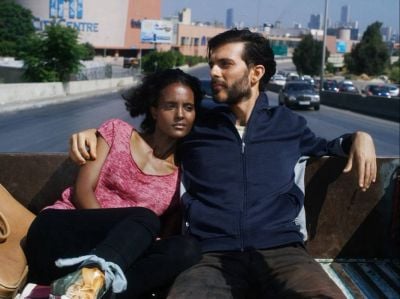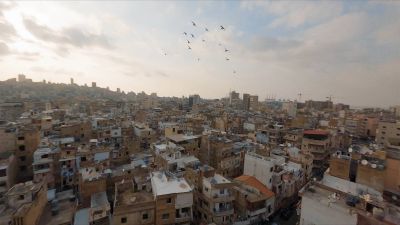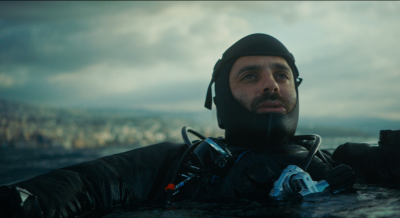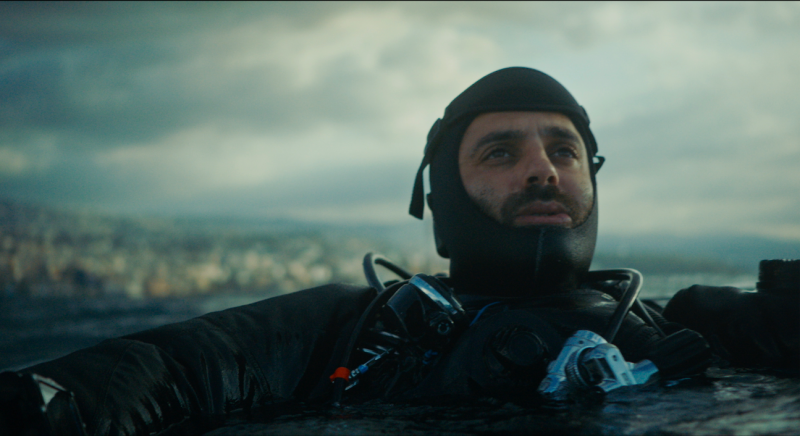
Alain Najm, in the open sea and with his back to the concrete city. (Courtesy of STANK Production)
What can a young man do when he is suffocated by the concrete and asphalt of the city, encircled by a profession that does not fulfill him and a society that no longer understands his aspirations?
Lebanese-born director Roy Arida seeks to answer these questions with his recent film, Under the Concrete, inspired by a true story.
Alain Najm is bored in his job as a sales representative. Turning to his passion — scuba diving — he goes deep into the Mediterranean sea, aided by a group of friends and his girlfriend, to find peace of mind and answers to his questions.
Further away from his desk job, he discovers even more of the fragility and uncertainty in the world. How will he react?
Escape and meditation
Established in France for 17 years, Roy Arida has directed a dozen documentaries and short films. His film Under the Concrete represents his production company's signature product: his first feature film.
Despite his time in France, Arida has never cut ties with his native Lebanon.
"I am a filmmaker of exile," he told L'Orient-Le Jour.
In his films, he is often surrounded by French technicians and Lebanese actors.
"[It's] a mix that gives flexibility as well as different views in the work,” he explained.
Shot as a work-in-progress over the course of three years (2015 to 2017), Under the Concrete shows the evolution of the characters with twists and turns in the film's script.
The film invites viewers to observe Beirut from the outside— an overcrowded city, crushed by concrete and from which one wants to escape.
Alain chooses the sea as a place of escape, but it becomes a place of contemplation and meditation, one where he finds himself and begins an inner journey.
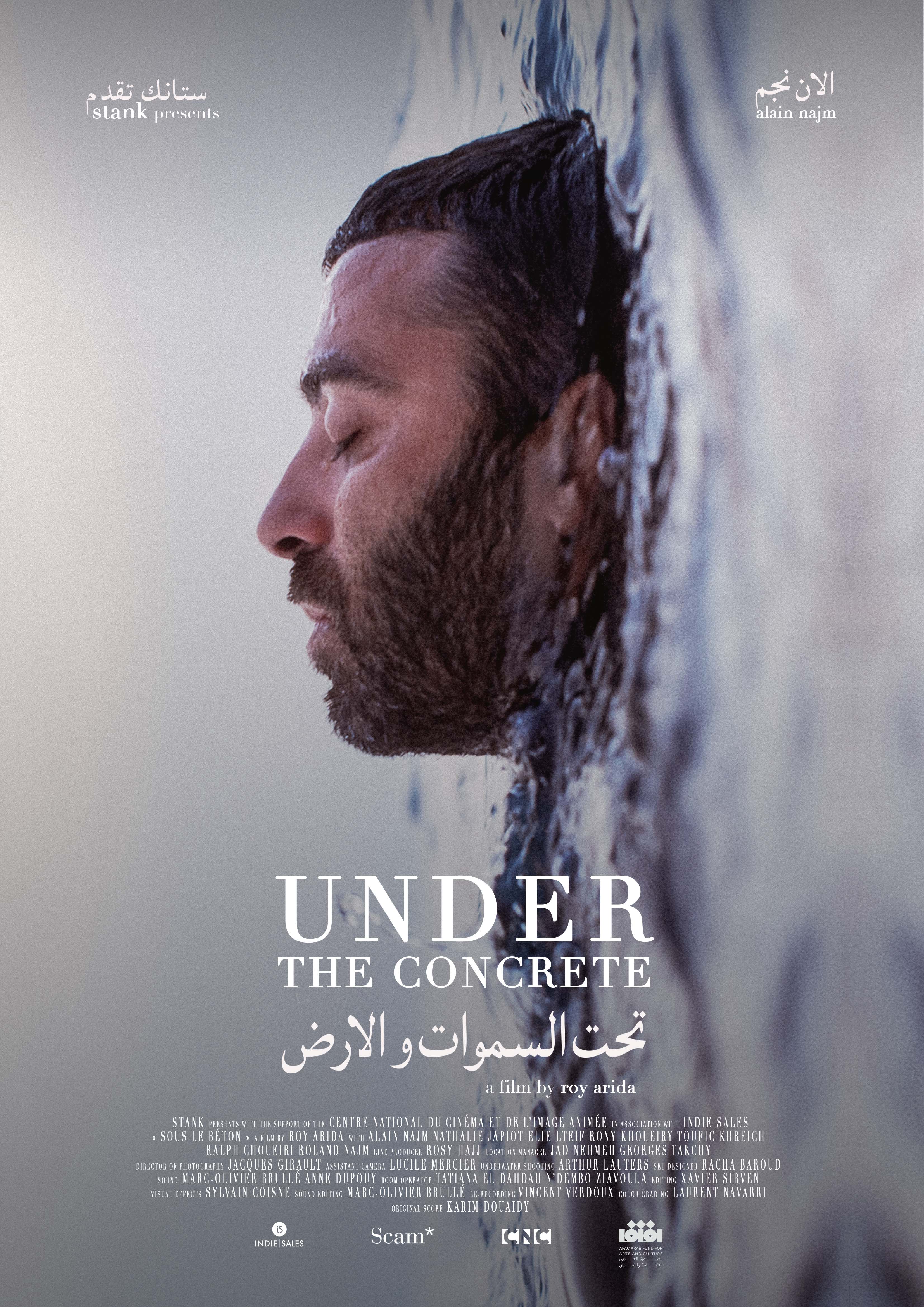 The poster for the movie “Under the Concrete.”
The poster for the movie “Under the Concrete.”
The awakening...
Unlike the city, the sea is a refuge. In the swirls and ripples of its water, Alain returns to the fetal state in the womb.
“He is at a stage in his life where he wonders if he is in control of his life," said Arida. “This challenge is a way for him to test himself but also to wake up. It's a reminder to him that he is just dust on this planet.”
He continued: "This film suggests that one cannot live alone but must turn to others and the only way to wake up is to come close to death in order to understand how much one is alive."
The film addresses concepts like the meaning of life and the importance of taking a break in order to move forward.
Shot in the depths of the sea, Arida admitted without hesitation that the film was extremely difficult to make.
"Not technically, since it is a simple camera that is placed in a pressurized chamber, but because underwater, there are many safety elements to respect that are related to chemistry [mixing of gases, decompression and aclimitizing]. On the other hand, one cannot, underwater, speak to the actors or to the cameraman, and there are no reference objects which allow [the installation of] a camera. Everything had to be prepared in advance. We woke up at 4 am for a quasi-military briefing and we were in the water from 6 am until 6 pm without any break — and that lasted for nine weeks.”
Awarded Best Arab Film in Cairo, Jury Prize last year at the Tripoli Film Festival, Under the Concrete has been shown in about 15 festivals around the world. It can also be seen on the platforms of Shahed and Netflix.
The Lebanese Film Week's schedule:
Tuesday, Oct. 25
“1982” by Oualid Mouaness (100 minutes)
With Nadine Labaki, Mohamad Dalli and Rodrigue Sleiman
During the Israeli invasion of Lebanon in 1982, while teachers have the heavy responsibility of sending children home, 11-year-old Wissam is preoccupied with declaring his love for another student.
Location: Vox Cinemas at 7 pm, followed by a virtual interview with the director.
In Arabic, with English subtitles
Wednesday, Oct. 26
"Miguel's War" by Eliane Raheb (128 minutes)
For 37 years, Miguel has been exiled in Spain and has succeeded in his job as an interpreter. He returns to Lebanon to confront the ghosts of the past and to perform a kind of catharsis.
Location: The French Institute, at 7 pm, by invitation, followed by an interview with the director.
In Arabic and Spanish, with English subtitles
Thursday, Oct. 27
“We Are From There” by Wissam Tanios (82 minutes)
Two brothers of Syrian origin decide at the age of 20 to leave everything, including their family and country, to make a new life in two different cities. They have only one idea in mind: The hope for a better future.
Location: The French Institute, at 7 pm
In Arabic, with English subtitles.
Friday, Oct. 28
“State of Agitation” by Elie Khalife (73 minutes)
With Marwa Khalil, Fadi Abi Samra and Stephanie Attallah.
A more than enthusiastic, even agitated, filmmaker is in conflict with very contrasting thoughts. This gives birth to hybrid characters and funny situations.
Location: Vox Cinemas at 7 pm, followed by an interview with the director.
In Arabic, with English subtitles.
Saturday, Oct. 29
“Kash Kash” by Lea Najjar (90 minutes)
Location: Vox Cinemas at 5 pm
In Arabic with English subtitles.
“All This Victory” by Ahmad Ghossein (93 minutes)
With Flavia Bechara, Issam Bou Khaled and Adel Chahine.
Lebanon, July 2006. The war rages between Israel and Lebanon. Marwan heads south in search of his father. He finds himself locked in a house with his father's friends. Three long days facing fear and himself.
Location: Vox Cinemas at 7 pm, followed by an interview with the director.
In Arabic, with English subtitles.
Sunday, Oct. 30
“Death of a Virgin and the Sin of Not Living,” by Georges Barbari (87 minutes)
With Etienne Assaf, Adnan Khabbaz and Jean-Paul Frangieh.
Etienne is taken by one of his friends to a prostitute's house for the first time. This group of friends is faced with the test of masculinity and self-discovery.
Location: Vox Cinemas, at 7 pm, followed by an interview with the director.
In Arabic, with English subtitles.
This article was originally published in French in L'Orient-Le-Jour.
